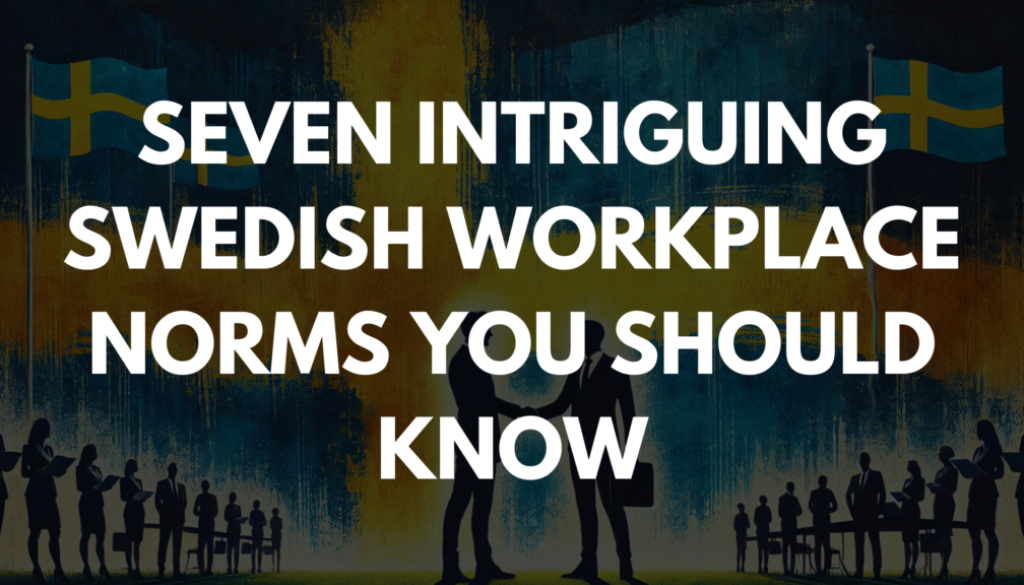Seven Intriguing Swedish Workplace Norms You Should Know
Last Updated on 9. Dec 2024 by b2bexport
Navigating cultural differences in the workplace is key to thriving in a new market.
This is especially true in regions like the Nordic countries, particularly Sweden, where local customs and work culture can significantly differ from what many companies are accustomed to. Understanding Swedish work-life balance, the emphasis on equality, and the unique aspects of Swedish business culture is essential for success.
Sweden, the third largest country in the European Union, is known for its highly developed society and strong commitment to gender equality.
From the cherished tradition of “fika” coffee breaks to the country’s generous paternity leave policies, Swedish workplace culture emphasizes well-being and a healthy balance between professional and private life. With about one fifth of Sweden’s population being foreign-born, the country’s diverse and inclusive culture enriches its business environment. Swedish companies benefit from being part of the European Union, promoting a competitive and collaborative international landscape.
Embracing these cultural nuances, including the informal yet professional dress code and the importance of building relationships through coffee breaks, can help businesses establish a strong presence in Sweden and the broader Northern European market.
Embracing Swedish Work Culture
Swedish work culture is known for its unique, often light-hearted approach to professional life.
From the cherished tradition of “fika” – a coffee break that fosters camaraderie among colleagues – to a strong emphasis on work-life balance and flexible working hours, Swedish workplaces are characterized by values and practices that may seem unconventional to outsiders. Recognizing and embracing these norms is essential for businesses looking to establish strong relationships and operations in Sweden.
1. Flat Organizational Structure
Swedish workplaces often adopt a flat organizational structure, minimizing bureaucracy and promoting a more egalitarian environment.
Unlike traditional hierarchical structures with multiple management layers, a flat structure encourages open communication and direct employee involvement in decision-making processes. This setup fosters autonomy and empowerment, enabling employees to contribute their ideas and expertise to the company’s success.
While this structure offers numerous benefits, including increased engagement and faster decision-making, it may not be suitable for all business types, particularly those with complex operations.
2. The Tradition of “Fika”
Fika, a deeply ingrained tradition in Swedish culture, is much more than a simple coffee break.
It’s a social ritual emphasizing relaxation, connection, and savoring life’s small pleasures. In the workplace, fika breaks allow employees to step away from their desks and engage in casual conversations with colleagues, fostering a sense of community and enhancing overall well-being. To fully embrace fika, be present in the moment, foster community, enjoy the ritual, and savor the experience.
Incorporating fika into your workplace can lead to increased satisfaction and improved communication.
- Be in the moment: Fika is about taking a genuine break from work. Set aside your tasks and fully immerse yourself in conversations and interactions with your colleagues.
- Build community: Use fika as a chance to deepen connections with your coworkers, sharing stories and experiences to strengthen professional relationships.
- Appreciate the ritual: The beauty of fika lies in the ritual. Relish the process of making coffee or tea, picking a delicious treat, and creating a cozy space for everyone to gather.
- Encourage inclusivity: Invite colleagues from various departments or levels to join your fika breaks. This helps build camaraderie and breaks down traditional workplace barriers.
- Enjoy the moment: Take time to savor the taste of your drink and snack, and enjoy the company of your coworkers.
Fika serves as a reminder to slow down and enjoy life’s simple pleasures.
Integrating this tradition into your workplace can bring numerous benefits, including higher employee satisfaction, better communication, and a more cohesive work environment.
By embracing this distinctly Swedish practice, you can cultivate a more positive and balanced work culture that resonates with the values of your Swedish colleagues.
3. Work-Life Balance and Flexibility
In Sweden, there’s a strong emphasis on achieving a healthy work-life balance.
The Swedish approach to work includes flexible working hours, or “flextime,” allowing employees to adjust their schedules to better suit their needs. This flexibility enhances productivity and satisfaction, as employees enjoy greater control over their work lives.
Studies show that employees with a healthy work-life balance are more motivated and committed to their jobs, leading to reduced stress and improved performance.
4. The Concept of “Lagom”
“Lagom,” meaning “just the right amount,” is a guiding principle in Swedish culture, promoting moderation and balance.
Embracing lagom in business practices can align your company with Swedish values. Focus on steady progress, balanced decision-making, and sustainable growth. Create products that offer lasting value and communicate honestly and straightforwardly.
This approach fosters trust and long-lasting relationships with Swedish customers and partners.
- Business Practices: Swedish companies often focus on long-term stability and sustainable growth rather than immediate profits. You should adopt a similar strategy by aiming for gradual progress, balanced decision-making, and ethical behavior. Encourage open communication, teamwork, and consensus-based decisions to build a collaborative and inclusive work environment that appeals to Swedish employees and partners.
- Product Offerings: To succeed in the Swedish market, balance quality, functionality, and aesthetics. Swedish consumers value products that are well-designed, reliable, and sustainable. Develop products and services that provide enduring value, adhere to high standards of quality and sustainability, and incorporate elements of simplicity and practicality.
- Marketing Strategies: Given the high digital literacy in Sweden, online marketing channels are particularly effective. When crafting your marketing messages, follow the principle of lagom. Communicate clearly and honestly, highlighting the benefits and value of your products and services without exaggeration. Also, emphasize your commitment to sustainability and social responsibility, as these values are highly appreciated by Swedish consumers.
Embracing the principle of lagom in your business efforts can lay a strong foundation for success in the Swedish market.
This approach allows you to align with local preferences and expectations, fostering trust, understanding, and long-lasting relationships with your Swedish counterparts.

5. Casual Dress Code
The Swedish approach to workplace attire is generally more relaxed and casual compared to other countries.
This laid-back attitude towards dress code reflects the egalitarian values of Swedish society. Employees typically dress comfortably and practically, promoting open communication and collaboration. Adapting to this casual environment involves observing your colleagues, focusing on comfort and practicality, and maintaining professionalism.
Adapt and Blend In: Observe the dress code and general atmosphere in your Swedish workplace. Mirror your colleagues’ attire to seamlessly fit into the local work culture.
Choose Comfort and Functionality: Opt for clothing that is both comfortable and practical for your work setting. Strive to maintain a balance between looking professional and feeling comfortable.
Consider Industry Norms: The level of formality in dress codes varies across industries. While tech and creative fields are generally more casual, sectors like finance and law often require more formal attire. Stay aware of the expectations within your industry.
Encourage Open Dialogue: In keeping with the informal atmosphere, promote open and honest communication with your colleagues. Foster discussions, listen attentively, and be receptive to feedback and collaboration.
Maintain Professional Conduct: Even with a casual dress code and relaxed atmosphere, it’s crucial to uphold professionalism. Be punctual, respectful, and dedicated to producing high-quality work.
Embracing the casual dress code and informal atmosphere typical of Swedish workplaces can foster a more comfortable and open work environment.
This approach encourages collaboration, communication, and strong interpersonal relationships, helping your business adapt to the Swedish market and build lasting connections with local partners.
6. Consensus and Collaboration
Swedish work culture places a strong emphasis on consensus and collaboration, reflecting values of egalitarianism and inclusivity.
Decisions are made collectively, with input from all relevant stakeholders. This approach fosters unity and shared responsibility. Swedish companies often adopt flat structures and team-based projects to facilitate collaboration.
1. Flattened Organizational Hierarchies: Many Swedish companies implement a flat organizational structure, reducing hierarchical layers and promoting open communication across all levels.
This setup encourages collaborative decision-making by facilitating the exchange of ideas, knowledge, and expertise throughout the organization.
2. Team-Centric Projects: Projects and tasks in Swedish workplaces are often organized around teams, with each member contributing their unique skills and expertise towards a common objective.
This teamwork-driven approach enhances collaboration and instills a sense of shared responsibility for the project’s success.
3. Frequent Meetings and Open Dialogues: To promote consensus and collaboration, Swedish companies often conduct regular meetings, workshops, and brainstorming sessions involving all team members.
These gatherings offer a platform for employees to share their ideas, ask questions, and engage in open discussions about ongoing projects and decisions.
4. Valuing Diverse Perspectives: In Swedish work culture, diverse viewpoints and opinions are highly valued and deemed essential for well-informed decision-making.
Employees are encouraged to express their thoughts and actively participate in the decision-making process.
Teamwork and communication are pivotal to Swedish work culture, emphasizing consensus and collaboration.
This strong focus on collaboration creates an environment where employees feel valued, engaged, and committed to the company’s success. Promoting open communication and active participation in decision-making fosters a sense of unity and shared purpose, leading to higher employee satisfaction, improved productivity, and better overall results. To succeed in the Swedish market, it is crucial to understand and embrace the country’s emphasis on consensus and collaboration.
By creating a work environment that values teamwork, open communication, and collective decision-making, your business can align with Swedish work culture and establish strong, lasting relationships with local counterparts.
7. Gender Equality
Sweden is renowned for its commitment to gender equality, extending to the workplace.
Swedish companies actively promote equal opportunities for all employees, regardless of gender. This includes policies like equal pay, generous parental leave, flexible working arrangements, and diversity initiatives. Embracing gender equality can attract and retain top talent, enhance creativity and innovation, and improve company reputation.
Businesses that prioritize equality benefit from a diverse workforce and better financial performance.
1. Pay Equity: In Sweden, companies are legally mandated to ensure equal pay for men and women performing the same work.
This strong commitment to pay equity helps narrow the gender pay gap and fosters a fair workplace environment.
2. Generous Parental Leave: Sweden boasts one of the world’s most generous parental leave policies, providing 480 days of paid leave per child, which can be shared by both parents.
This policy supports a balanced approach to child-rearing, allowing both men and women to actively participate in their families while sustaining their careers.
3. Flexible Work Options: Many Swedish companies offer flexible working hours and remote work opportunities, helping employees balance their professional and personal lives.
This flexibility is particularly advantageous for parents and caregivers, making it easier to manage both work and family obligations.
4. Diversity and Inclusion Programs: Swedish companies frequently implement initiatives aimed at increasing the representation of women and other underrepresented groups in the workplace.
These efforts may include targeted recruitment, mentorship programs, and training to address unconscious bias and promote diversity awareness.
Adopting gender equality practices can provide numerous benefits for businesses:
- Attracting and Retaining Talent: An inclusive and equitable workplace attracts a diverse pool of talent and helps retain top performers who value fairness and equal opportunities.
- Boosting Creativity and Innovation: Diverse teams with balanced representation offer a wider range of perspectives, fostering creativity and innovation in problem-solving and decision-making.
- Enhancing Company Reputation: Demonstrating a commitment to gender equality can improve a company’s reputation among customers, partners, and potential employees, leading to better brand perception and overall business success.
- Improving Financial Performance: Research indicates that companies with gender-diverse leadership teams tend to outperform those with less diversity, highlighting the financial benefits of gender equality.
In conclusion, gender equality is a cornerstone of the Swedish workplace, with businesses actively supporting policies that promote equal opportunities for all employees.
By embracing gender equality, your company can benefit from a more diverse and talented workforce, enhanced creativity and innovation, and a stronger market reputation. This commitment to equality can significantly contribute to your long-term success in Sweden and beyond.

How Swedish Business Culture Differs from Its Neighbors
Sweden, part of the Scandinavian Peninsula and a highly developed country, stands out in Northern Europe not only for its beautiful landscapes but also for its distinctive business culture.
While Sweden shares many cultural similarities with other countries in Northern Europe such as Finland, Norway, and Denmark, it also boasts unique nuances that set it apart.
Swedish Consensus vs. Finnish Directness
Swedish business culture places a significant emphasis on consensus-driven decision-making, focusing on collaboration and inclusivity.
This approach is deeply rooted in Swedish culture and contrasts with the more direct and straightforward Finnish business culture, which values efficiency and brevity in communication and decision-making. In Sweden, the emphasis on consensus ensures that all voices are heard, fostering a sense of unity and shared responsibility.
Formality in Communication
Although all four countries generally favor informality and egalitarianism in the workplace, their communication styles differ.
Swedish and Danish business cultures are particularly informal, often using first names and casual language. This informality extends to other aspects of Swedish workplace culture, where hierarchies are less pronounced, and employees feel comfortable engaging with most managers directly. Norwegian business culture shares this informality, while Finns may exhibit slightly more formality, especially during initial interactions.
Flexibility and Punctuality
Swedes and Norwegians place high importance on punctuality, strictly adhering to schedules and deadlines.
This is a reflection of the well-organized nature of Swedish companies and the broader Swedish culture, which values time management and efficiency. On the other hand, Danes and Finns might allow for more flexibility in timing, enabling spontaneous meetings and decisions, which can be advantageous in dynamic business environments.
Hierarchy and Decision-Making
All four countries advocate for flat organizational structures, but the emphasis varies.
Swedish companies often prioritize consensus and collaboration, whereas Norwegian and Danish organizations may delegate decision-making more freely. Finnish companies, though relatively flat, can be more hierarchical and directive in their approach.
This difference is crucial for foreign-born professionals to understand when entering these markets, as it influences how decisions are made and how teams operate.
Attitudes Towards Risk and Innovation
Swedish and Danish business cultures are generally more open to taking risks and embracing innovation, evident in their thriving start-up ecosystems.
This openness to new ideas and willingness to experiment is a cornerstone of Sweden’s position as a leader in innovation within the European Union. In contrast, Finnish and Norwegian businesses, while innovative, tend to be more risk-averse, focusing on stability and long-term planning rather than rapid growth.
Relationship-Building
All four countries value building relationships in business, but their methods differ. Swedes and Danes often engage in informal socializing and team-building activities.
A common Swedish tradition that facilitates this is the “fika,” or coffee break, which is a fundamental part of the workday and essential for building camaraderie. Finns might prefer structured, purposeful interactions, while Norwegians balance informal socializing with purposeful networking.
Understanding these practices is vital for integrating into the business culture of each country.
Work-Life Balance and Well-Being
Sweden is renowned for its excellent work-life balance, a crucial aspect of Swedish workplace culture.
Policies such as generous parental leave, including paternity leave, and a focus on employee well-being reflect this. The Swedish government supports these practices, ensuring that both private businesses and public sectors adhere to laws promoting a balanced life. This commitment to well-being is a model that many other countries look up to.
While Sweden, Finland, Norway, and Denmark share many business culture values and characteristics, each country has unique nuances.
Understanding these differences and adapting your approach is essential for successful business interactions and expansion in the Nordic region. Whether you are a company looking to expand or an individual seeking a new job in a new country, appreciating these cultural distinctions will help you navigate the complex landscape of Northern European business effectively. Sweden’s blend of consensus-driven decision-making, informal communication, and innovative spirit makes it a unique and attractive destination for businesses and professionals alike.
Embracing the Swedish approach to work and life can lead to fruitful relationships and successful ventures in this vibrant part of the world.
Conclusion
Understanding the nuances of Swedish work life balance and Swedish workplace culture is crucial for successful business expansion in Sweden and other countries in Northern Europe.
By embracing local norms and values inherent in Swedish culture, businesses can foster strong relationships with Swedish partners, customers, and employees. This cultural alignment enhances the company’s reputation and contributes to long-term success in the Swedish market. Recognizing the importance of gender equality, coffee breaks called fika, and the balance between private life and professional commitments, can significantly impact your integration into the Swedish business environment.
Sweden’s population values well-being and has fundamental laws that support a healthy work-life balance, including generous sick leave and paternity leave policies.
These aspects, coupled with Sweden being a highly developed country with a constitutional monarchy, provide a unique environment for businesses to thrive. Furthermore, Sweden is the third largest country in the European Union, adding to its strategic importance. Be patient, open-minded, and willing to learn as you navigate the exciting journey of international expansion into this Scandinavian peninsula.
Cultivating a deep understanding of the business culture in each Nordic country, such as Denmark, Norway, and Finland, equips you to navigate challenges and opportunities, ultimately achieving long-term success in these thriving markets.
Engaging with the highly developed Swedish business culture, where most managers and employees value the importance of a balanced life, can open doors to significant opportunities.
By aligning your business practices with the core values of Swedish society and the broader European Union, you can establish a strong presence and build lasting relationships.





